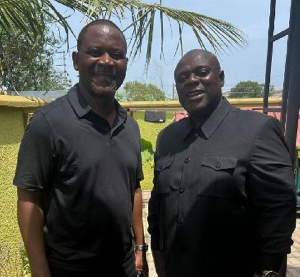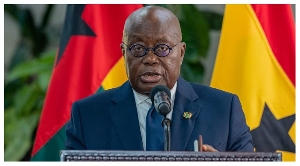- Home - News
- TWI News | TV
- Polls
- Year In Review
- News Archive
- Crime & Punishment
- Politics
- Regional
- Editorial
- Health
- Ghanaians Abroad
- Tabloid
- Africa
- Religion
- Election 2020
- Coronavirus
- News Videos | TV
- Photo Archives
- News Headlines
- Press Release
General News of Saturday, 29 March 2003
Source: .
"Amend the Constitution" - Justice Annan
SEVEN eminent Ghanaians, including a former Speaker of Parliament, Mr Justice D.F. Annan, have called for the amendment of certain portions of the 1992 Constitution to enhance the smooth running of the country.
They said 10 years after the application of the Constitution, there is the need to critically examine areas such as the transitional provisions, the various commissions of state, chieftaincy and their role in national development, the administration of stool lands, the appointment of ministers of state from Parliament and the election of District Chief Executives, with the view to initiating a debate to ensure that any amendment will meet the aspirations and hopes of the generality of the people.
They were speaking at a forum organised by the Institute of Economic Affairs (IEA) to launch a series of programmes to discuss “Ten years of the 1992 Constitution”.
The speakers were Mr Justice George Lamptey, a retired Supreme Court Judge, Mr Justice Kwame Afreh, a Supreme Court Judge, the Okyenhene, Osagyefuo Amoatia Ofori Panin, Mr B.J. da Rocha, Senior Fellow of the IEA and Chairman of the Police Council, , Professor Yaw Saffu, Senior Fellow of the IEA and Nana Dr S.K. B. Asante, President of the Ghana Academy of Arts and Sciences.
It was also attended by Ministers of State, MPs, Chiefs, Members of the Diplomatic Corps, the Clergy, Security Personnel, members of the academia and a across-section of the public.
The speakers contended that the Constitution is a dynamic document which must be reviewed or amended to suit the realities of the times.
Justice Annan stressed the need for “reasonable and efficient modalities for constitutional review as an entrenched feature of our constitutional practice.” He said the 1992 Constitution, by its structure and design, opens itself up to periodic assessment or evaluation but cautioned that care must be taken to avoid abuse of the provision.
The former Speaker indicated that “this process of monitoring, evaluation and implementation should be the common concern not only of academics, professionals and politicians, but of all citizens”.
He said in order to locate such a review process in its appropriate context, "it is necessary to take a good look at the values of society against the background of our history, traditions, customs and culture."
Justice Annan called for a shift from the politics of democracy to that of economics democracy adding that, “the directive principles should be our guide and should form the bedrock of our national development policies and programmes.
Justice Lamptey, on his part, said the 1992 Constitution was not imposed on Ghanaians by the PNDC Government but it represents and reflects the aspirations and beliefs of the majority of Ghanaians in an elective government of the people for the people and by the people.”
He said since “the 1992 Constitution has been in operation for 10 years, there is the need to examine and determine whether or not the machinery of governance established and created by the Constitution has achieved its objectives”.
Justice Lamptey said it is important to have a comprehensive national debate on the amendment of certain portions of the Constitution such as the appointment of regional ministers from Parliament, the involvement of chiefs in active politics, chiefs and their role in local government, district assemblies and the performance of the constitutional institutions such as the National Commission for Civic Education (NCCE), Commission on Human Rights and Administrative Justice (CHRAJ), the National Media Commission (NMC) and the Electoral Commission (EC).
The retired Supreme Court Judge also touched on the judiciary, the mandatory provisions of the constitution as well as its conventions and the transitional provisions and stressed the need for an intensive debate before any amendment is carried out.
Justice Lamptey said in seeking to amend any provision or adding any provision to the Constitution, sight must not be lost of the intention of law makers and noted that “after 10 years of democratic governance guided and dictated by the 1992 Constitution, it is indeed proper and desirable that the provisions of this constitution be critically and constructively examined and evaluated in the light of the aspirations and hopes of the generality of Ghanaians.”
Justice Afreh called for a critical look at the political parties law to compel the parties to strictly adhere to the rules set out in the Constitution.
He mentioned the sources of funds for the parties and their financing by the state as other crucial areas that need to be considered when the Constitution is to be amended.
Osagyefuo Ofori Panin, who chaired the function stated that there is no legal basis for the Forestry Commission to appropriate as much as 60 per cent of revenues as management fee for forest management without reference to stools.
He said at the very least the commission should negotiate the fee and not arbitrarily impose it on stools and noted that “the issue of accountability is also missing as we are not told what the 60 per cent is actually used for”.
Osagyefuo Ofori Panin was of the view that the practice appears to conflict with the original Forestry Ordinance of 1927, which limits management fees to a third of revenues or actual expenses and yet stools are not legally empowered to ascertain whether or not the law is adhered to.
He questioned the basis for which the Forestry Commission still functions based on laws, rules and regulations and described it as unconstitutional and mentioned the Concessions Act, the Timber Resources Management Act and the Administration of Lands Act to buttress his point.
Professor Saffu suggested that a critical look be taken at the Constitution in the light of the experiences of more than a decade and in the light of the inevitable changes wrought by time.
Mr da Rocha warned against any hasty move to amend the Constitution adding that the incompetence and failure of certain institutions and officials to properly implement certain provisions of the Constitution should not be the basis for which the provisions should be amended."
He said the human shortcomings in the implementation of the Constitution should be identified to avoid any amendment that will not be in the interest of the nation.
Mr da Rocha said the constitution being a product of human effort cannot be absolutely perfect but it is still serving its purpose and, therefore, there should not be any hasty calls for amendments just because of improper implementation.










